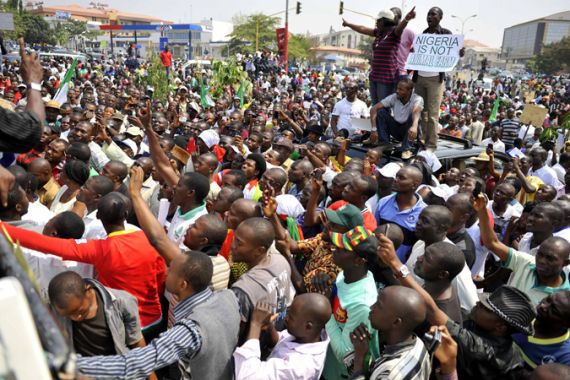Nigeria protests on hold as oil strike looms
Unions call for weekend halt of mass protests to allow talks on fuel crisis that threatens to choke off oil production.

A nationwide strike and mass protests has shut down Nigeria for a fifth day, but union leaders have called for a weekend pause in demonstrations as talks sought to avert a halt in oil production.
It was announced on Friday that the first round of negotiations between labour leaders and top government officials, including President Goodluck Jonathan, had failed to reach a deal on Thursday night over soaring fuel prices.
The main oil workers’ union has threatened to shut crude production beginning on Sunday if the government does not reverse a move that ended fuel subsidies on January 1, more than doubling pump prices in Africa’s top crude exporter.
Labour officials have said the government had offered to reduce petrol prices to 120 naira per litre [$0.74], down from the current 140 [$0.93] or more, but unions have not yet accepted the proposal.
Al Jazeera’s Haru Mutasa, reporting from the Nigerian city of Kano, said the removal of the fuel subsidies was a heavy blow.
“You can’t abruptly remove something people are used to, especially when many believe the [subsidies] are the only benefit they get from living in an oil-rich country,” Mutasa said.
Unions have said that until a deal is reached, the proposed strike by oil production workers on Sunday is still on. More talks are set for Saturday.
According to union sources, protests are suspended so people can rest in case a deal is not agreed at the weekend and they need to protest more next week,
Union officials said the pause in talks until then was to allow for labour officials from across the country to gather in Abuja and discuss the way forward.
With domestic flights grounded, they would be forced to come by road.
Sunday shutdown
World oil prices moved higher in Asian trade on Friday over concerns that Nigerian supplies could be hit by the planned oil strike.
Although strikes have paralysed Africa’s most populous country, and brought tens of thousands of people on to the streets, oil workers have so far not moved to halt output of crude, the country’s economic lifeline.
Babatunde Ogun, president of the 20,000-strong PENGASSAN oil workers’ union warned that “from Sunday, we are shutting down”.
The blue-collar union NUPENG had already joined the strike.
“A shutdown of oil production in Nigeria means a potential loss of at least three per cent of global oil production,” said Kayode Tinouye, an analyst with Lagos-based Afrinvest.
OPEC member Nigeria produces more than two million barrels per day and is a key supplier of crude to the US and European Union.
Inadequate infrastructure
Protests pushed ahead on Friday, including thousands in the economic capital Lagos, where Muslims held prayers at the main protest ground.
Since demonstrations against the subsidy cuts started, hundreds of thousands of people have staged protests in cities across Africa’s largest crude oil producing country, with at least three people reported killed in the demonstrations.
Abdulwahed Omar, Nigeria Labour Congress president, on Friday told a rally in Abuja that Monday will see “the mother of all crowds” if the government does not backtrack.
Government officials and economists say removing subsidies was essential and will allow much of the $8bn per year in savings to be invested into projects to improve the country’s inadequate infrastructure.
“The government argues that the money they will save [by removing the subsidies] will go to the country, some people believe that and some don’t,” said Mutasa.
“Many are concerned the money will simply line the pockets of some corrupt officials.”